[Pride 2020] Magical Places: Stories Of Lesbianism, Adolescent Exploration, And Fantasy
An intimidating formation of phallic rocks, jutting up from the ground and looming over the terrain around it, waits for us all. Even though the rocks are in its own geological adolescence, it has waited for thousands of years for each of us to come explore its dangerous curves, platforms, and tall, hard surfaces. Explore carefully, each and every one of you, for there are venomous snakes lurking. Hanging Rock is the place where adolescents forget their social teachings and stumble into sexual desire.
On the morning of Saint Valentine’s Day, in the year 1900, the girls of Appleyard College spend the morning reading love poems, helping each other dress, whispering to each other like playful schoolgirls, and playing children’s games in the yard. They splash their young, unblemished faces with water from a basin filled with flowers. Dressed in virginal white, most of the girls leave for a picnic at Hanging Rock.
As they leave they receive a parting warning: Do not partake in the “tomboy foolishness” of exploration because even the lowest platforms of Hanging Rock are dangerous. The warning feels contrived and unfair, particularly here, where it’s spoken similarly to parents who deny their daughters an exploration of their sexuality while turning a blind eye to a son’s experimentation.
As the girls leave town in their carriage they begin to shed the restriction of society’s norms, excitedly removing their gloves. After spending some time lounging at the base of the impending rock formation, four girls decide to travel deeper into Hanging Rock to probe the inner folds of its structure.
Miranda, Marion, and Irma let their hands run over the surface of the rocks as they look up at their domed tops. As they delve further into the formation they leave behind more of the customs they have been taught, removing their shoes and stockings. Edith tags along with the trio, but she does not touch the stiff, towering rocks nor does she look up at their tips. Edith keeps her stockings on and ultimately is not taken by the mysterious force that steals Miranda, Marion, and Irma. She was not ready to move into a new stage of adolescence.
The young women of Appleyard College are not the only ones about to stumble into the dangers of Hanging Rock. A young man by the name of Michael is close by, traveling with his uncle and aunt and their valet Albert. As Michael walks past his aunt and uncle towards the rock, he, too, is warned of its lurking dangers, such as snakes ready to strike and pump him full of their creamy venom. Michael goes to speak to Albert. They stand uncomfortably far apart from each other, maintaining social distance. Albert attempts to start a conversation with Michael, but Michael’s replies are shy and timid.
Albert offers Michael a drink from his wine bottle. Michael takes the wine bottle and wipes its opening on his jacket before taking a polite sip. Albert takes the bottle back to take another drink before offering it to Michael once again. Michael moves towards wiping off the bottle again, but decides against it. Instead he frees himself from courtly restrictions and allows his lips to touch the same surface where the lips of another man touched without barrier.
He then takes a swig of wine bigger than what is proper and some of the wine dribbles from his full mouth and down his chin. Later, as Michael and Albert lounge in the grass together, they see the four girls from Appleyard College on their way to the unsafe interior of Hanging Rock. Michael follows the same path the girls take and while he is not taken by Hanging Rock’s mysterious force that day, he later has his own experience with the unknown on Hanging Rock when he searches for the missing girls overnight.
While most of the girls from Appleyard venture to Hanging Rock, one girl is held behind by the headmistress, Miss Appleyard. Sara Waybourne must study poetry under the strict supervision of Miss Appleyard while the other girls go on their Saint Valentine’s picnic. Miss Appleyard chastises Sara for her inability to memorize poems of the school’s choosing. Instead of giving in to Miss Appleyard’s academic commands, Sara attempts to recite a love poem of her own writing which is surely about Miranda, but she is quickly cut off by Miss Applewood.
Sara’s love for Miranda is far from a hidden secret. She frequently refers to her as variations of, “my dear, sweet Miranda” in a longing, breathy sigh. Before the Saint Valentine’s outing Miranda acknowledges Sara's love for her while Sara sits with Miranda as she brushes her hair. After Miranda’s disappearance on Hanging Rock Sara places Miranda’s favorite flowers in front of a picture of her that Sara keeps on her bedside table, a small altar to her lost love.
It is interesting that the girl who shows love for other young women is the one that is held back from the trip to a symbol of adolescent sensual desires. This exclusion of a non-heteronormative person reflects something we see in our own culture.
Straight adolescents, especially straight boys, are often allowed to explore some of their sexual feelings in its early stages. Teens who fall outside the heteronormative box, however, are often stunted in their sexual exploration by the overwhelming pressure of cultural norms pressing down on top of them. Many queer youths must keep their true sexual desires hidden until it is safe for them to explore in adulthood. The lack of safe, neutral spaces that allow for adolescents to explore sexual desires that are not heterosexual also keeps some people from recognizing their same-sex attraction until they are older.
There is a theme in some films of women loving women relationships being portrayed as an (often unhealthy) coping mechanism for an emotional void somewhere in a woman’s life. Sara is an orphan who has been abused at past orphanages and who has lost contact with her last remaining family, her big brother Bertie. Her love for Miranda is presented as an unsound attachment for the lack of familial love in her life. Even Miranda herself expresses both concern and dismissiveness towards Sara’s love for her.
In the hairbrushing scene, Miranda tells Sara she must learn to love someone else because Miranda won’t be there much longer. This conversation shows Miranda’s concern that Sara’s devotion to her is keeping Sara from connecting to other people. Later, while the four girls are on Hanging Rock, Edith brings up the poetry Sara writes about Miranda and Miranda dismisses this with “she’s an orphan.”
Peter Weir’s Picnic at Hanging Rock (1975) is not the only fantasy horror film with themes of adolescent sexuality and lesbianism from the Australasia region. Peter Jackson’s 1994 film Heavenly Creatures tells the real life story of an intense connection between two girls, Pauline Parker and Juliet Hulme, that goes beyond unhealthy and into murderous.
Just like in Picnic at Hanging Rock we see the young subjects of Heavenly Creatures symbolically remove their culture’s regulations early on in the film. It starts when Pauline pulls down her stocking, after a quick glance to make sure no one is watching, in order to show Juilet a childhood scar. Later, the stripping of their social decency through the removal of clothes is pushed further when both girls undress to their undergarments while playing in the woods.
The idea of lesbianism being connected to family strife is also carried into Heavenly Creatures. Juliet has been abandoned throughout her life by her parents as they leave for long trips without her and send her to far away countries without them for her health. Despite promising her they will never leave her again they continue to abandon her. Pauline's family is loving, but she is embarrassed by their lower class status. Her embarrassment causes her to push them away, isolating her from their love. Desperation for a love that is understanding and steadfast drives these two young women together.
Upon hearing that her parents yet again plan to leave her behind as they take a several weeks long trip abroad, Juliet runs crying from her family, Pauline close behind. Juliet eventually collapses with emotion. As Pauline holds her, Juliet suddenly begins to talk about a beautiful fantasy land in front of them. It is clear that Juliet uses her fantasies to cope with her parents’ emotional neglect. Throughout the film, both girls use the fantasies they create together to deal with a variety of feelings such as imagining their prince killing people who make them angry.
Most importantly Juliet’s and Pauline’s fantasy world allows them to role play their sexual desires using a safe, familiar, heteronormative script. When Juliet finds herself in the hospital with tuberculosis and unable to have visitors, Pauline begins to write to her as if Juliet was Queen Deborah of their fantasies and Pauline was her horny husband King Charles. They are able to voice their fondness for each other through writing love letters between a husband and wife.
Towards the end of the film Juliet and Pauline have sex while pretending to be ravished by an Orson Welles character, once again allowing them to explore their desire for each other in a heteronormative way. During the time that Juliet is in the hospital Pauline loses her virginity to an older man. During sex she imagines herself inside the girls’ shared fantasy land. She desperately tries to find Queen Deborah in a crowd of clay people. When Deborah finally turns around she is revealed to be Juliet.
The persona of Queen Deborah, the fake woman Pauline wrote passionate love letters to, and the reality of Juliet becomes synonymous to Pauline. When Pauline is told she is no longer allowed to see Juliet it is Deborah Pauline cries about - saying she will die without being able to see Deborah - not Juliet. It is clear the lines of fantasy and reality became blurred for Juliet and Pauline beyond recognition because of their attempts to process complex emotions about class, abandonment, illness, anger, and sexual desire through fantasy.


![[Pride 2020] Magical Places: Stories Of Lesbianism, Adolescent Exploration, And Fantasy](https://images.squarespace-cdn.com/content/v1/5b39608d75f9eef54c62c3f0/1590772185453-NZ9ZXHHMPT6CUFRZ1FXQ/MV5BNzZjODNhZjQtNmM5Ny00OGIxLWFiZjQtODRjYjI5MjhiZThiXkEyXkFqcGdeQXVyNjkxMjM5Nzc%40._V1_.jpg)
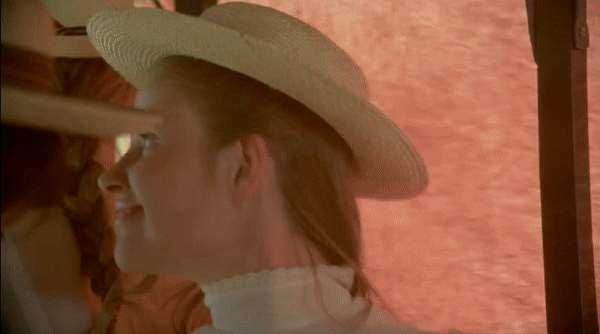
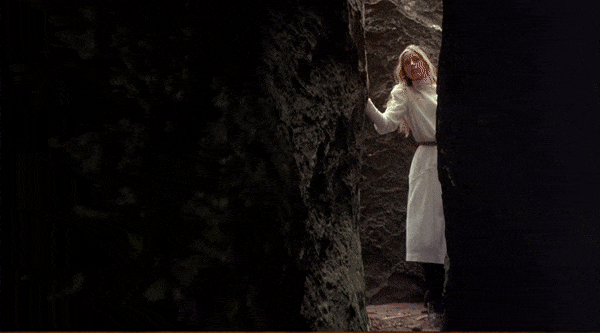
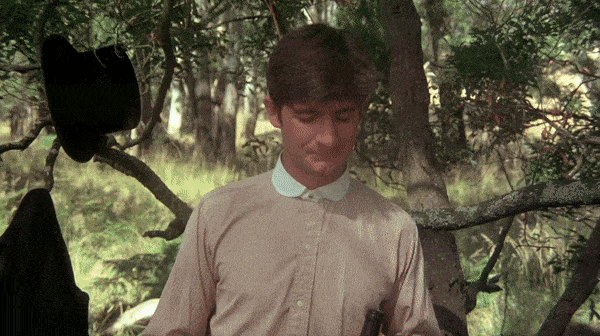
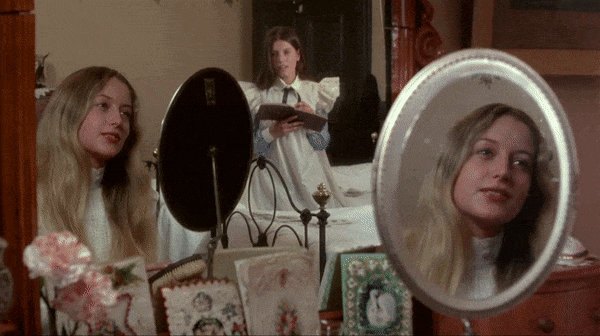

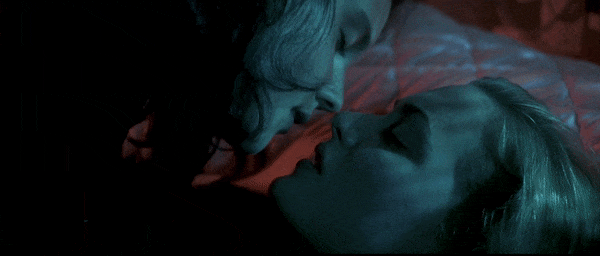

![[Pride 2020] For Sean, From My POV As A Horror Fan](https://images.squarespace-cdn.com/content/v1/5b39608d75f9eef54c62c3f0/1593484114370-B09RZEZ6FWKW8TFIG0NA/Sean%2Bpic%2B1.jpg)
![[Pride 2020] Finding Jennifer; Or, How I Learned to Stop Hating Jennifer's Body](https://images.squarespace-cdn.com/content/v1/5b39608d75f9eef54c62c3f0/1593483718013-3AP23VJDN9V0MMA6V3DU/51d02d6fb673bec72cb41a366c86bb39.jpg)
![[Pride 2020] Good Manners Deconstructs Class and Racial Disparities in Brazil](https://images.squarespace-cdn.com/content/v1/5b39608d75f9eef54c62c3f0/1593398398356-6QRX0G4PK4S87TKTMF0T/1270796_goodmanners_432313.jpg)
![[Pride 2020] The Power Of Difference In Hellraiser's Queerness](https://images.squarespace-cdn.com/content/v1/5b39608d75f9eef54c62c3f0/1593397752213-22GFO5I1QW8I220F5MZM/hellraiser_hed.jpg)
![[Pride 2020] Love, Trauma And Horror](https://images.squarespace-cdn.com/content/v1/5b39608d75f9eef54c62c3f0/1593323224833-38FH4ANZTM88LXS5HG5M/Hush.jpeg)
![[Pride 2020] A Lance in the Throat: Scary Heteros in Almodóvar’s “Matador”](https://images.squarespace-cdn.com/content/v1/5b39608d75f9eef54c62c3f0/1593322407370-GXK7L0BP0D7QNTN1FFPE/ede3ca1c-1165-11e8-9ac6-bbf931a203ee4.jpeg)
![[Pride 2020] The Mischa Project](https://images.squarespace-cdn.com/content/v1/5b39608d75f9eef54c62c3f0/1593231688339-UJSAXF4NN6K1ETEK9EBS/41000240.jpg)
![[Pride 2020] Another Cheater](https://images.squarespace-cdn.com/content/v1/5b39608d75f9eef54c62c3f0/1593230510967-BTX8BAR5VDNNJO58OW7V/knife.jpg)
![[Pride 2020] Extreme Horror And Queer Affirmation In Martyrs](https://images.squarespace-cdn.com/content/v1/5b39608d75f9eef54c62c3f0/1593140634217-BSFPGD1GVAV693B06Q1X/film_martyrs.jpg)
![[Pride 2020] 13 Questions With Jeffrey Reddick](https://images.squarespace-cdn.com/content/v1/5b39608d75f9eef54c62c3f0/1590770998495-K2ZDM12WV8DRR9O8LD48/MV5BMTRjMmYwNWMtYzcyYy00MzIxLTkyOWEtMDc4YzlmYjkxYTQzXkEyXkFqcGdeQXVyMjQwMDg0Ng%40%40._V1_.jpg)
![[Pride 2020] The Quagmire Of Race And Horror In Cinema](https://images.squarespace-cdn.com/content/v1/5b39608d75f9eef54c62c3f0/1590782007541-NEREO1VR3PWF6TWIVM50/Get+out.png)
![[Pride 2020] Queerness And The Exploration Of Childhood Sexuality In Let The Right One In](https://images.squarespace-cdn.com/content/v1/5b39608d75f9eef54c62c3f0/1592178566522-7XK5LM2FJ320QNN3J3UA/0+A5Zx17NwSbry_6pr.jpg)
![[Pride 2020] The Power Of The Trans Monster In Bit And Switch](https://images.squarespace-cdn.com/content/v1/5b39608d75f9eef54c62c3f0/1592880971405-NFCCXW50AVB1PIPZQZVW/MV5BOWE0YjFhYTUtMWE2Zi00OWJkLTg2MzItY2VlYzUxMWE4YTM3XkEyXkFqcGdeQXVyMjE5MzYzNjU%40._V1_.jpg)